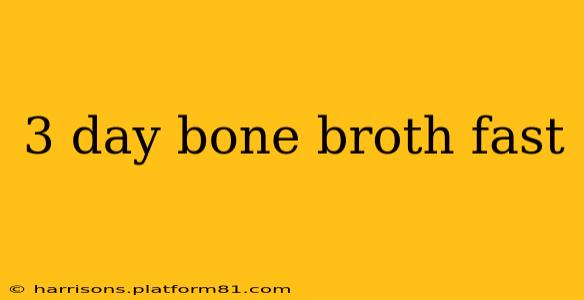The 3-day bone broth fast is gaining popularity as a way to cleanse the body, improve gut health, and potentially aid weight loss. But is it safe? Is it effective? And how do you actually do it? This comprehensive guide will explore everything you need to know about embarking on a 3-day bone broth fast, addressing common questions and concerns along the way.
What is a Bone Broth Fast?
A bone broth fast, unlike a complete water fast, involves consuming only bone broth for a specified period, usually several days. Bone broth is a nutrient-rich liquid made by simmering animal bones, often with added vegetables and spices. It's packed with collagen, gelatin, amino acids, minerals (like calcium, magnesium, and phosphorus), and electrolytes, making it a surprisingly filling and nourishing beverage, despite its low calorie count. The idea behind a bone broth fast is to provide the body with essential nutrients while minimizing caloric intake, allowing for a potential detoxifying effect and digestive rest.
Is a 3-Day Bone Broth Fast Safe?
This is a crucial question. While bone broth is generally considered safe for consumption, a 3-day fast, even one involving bone broth, isn't suitable for everyone. It's vital to consult your doctor or a registered dietitian before undertaking any extended fasting period, especially if you have pre-existing health conditions like diabetes, kidney disease, or eating disorders. Pregnancy and breastfeeding are absolute contraindications.
What are the Potential Benefits of a 3-Day Bone Broth Fast?
Proponents claim several potential benefits:
- Improved Gut Health: The collagen and gelatin in bone broth may help heal and soothe the gut lining, potentially beneficial for individuals with leaky gut syndrome or inflammatory bowel disease (IBD). However, more research is needed to confirm this.
- Reduced Inflammation: Some studies suggest that certain components in bone broth may possess anti-inflammatory properties. Again, more research is required to solidify these claims in the context of a fast.
- Weight Loss: The extremely low caloric intake during a bone broth fast can lead to weight loss. However, this weight loss is often temporary and may be regained once normal eating habits resume. Sustainable weight management involves a holistic approach to diet and lifestyle.
- Improved Joint Health: The collagen in bone broth is thought to support joint health, potentially alleviating some symptoms of arthritis.
- Boosted Immunity: The nutrients in bone broth might contribute to a stronger immune system, although this benefit needs further scientific validation in the context of fasting.
What are the Potential Risks of a 3-Day Bone Broth Fast?
While generally considered safer than a water-only fast, several risks are associated with a bone broth fast:
- Nutrient Deficiencies: Restricting your diet to only bone broth for three days can lead to deficiencies in essential vitamins and minerals not found in sufficient quantities in bone broth.
- Muscle Loss: Without sufficient protein intake, the body may break down muscle tissue for energy.
- Fatigue and Weakness: The low caloric intake can cause fatigue, dizziness, and weakness.
- Headaches and Digestive Issues: These are common side effects of fasting and can occur during a bone broth fast.
- Electrolyte Imbalances: Bone broth contains some electrolytes, but not enough to sustain the body for three days without potential imbalances.
How to Prepare for a 3-Day Bone Broth Fast
Proper preparation is crucial:
- Consult your doctor: This is paramount to ensure you're healthy enough for a fast.
- Gradual Reduction in Calories: Ease into the fast by gradually reducing your caloric intake in the days leading up to it.
- Hydration: Drink plenty of water throughout the fast.
- Electrolyte Support: Consider supplementing with electrolytes, particularly sodium and potassium, to minimize imbalances. Consult your doctor or a registered dietitian about appropriate supplementation.
What to Expect During a 3-Day Bone Broth Fast
You might experience:
- Hunger pangs: These are normal and will likely subside.
- Fatigue: Rest is crucial.
- Headaches: Stay hydrated and consider electrolyte supplementation.
- Changes in bowel movements: This is expected due to the change in diet.
Breaking a Bone Broth Fast
Gradually reintroduce food into your diet. Start with easily digestible foods like cooked vegetables and fruits before progressing to more substantial meals. Avoid overeating.
Can I Exercise During a Bone Broth Fast?
Avoid strenuous exercise. Gentle activity like walking might be acceptable, but listen to your body.
Is Bone Broth Fasting Right for Me?
A bone broth fast might seem appealing, but it's not a miracle cure. It's crucial to weigh the potential benefits against the risks and to discuss your decision with a healthcare professional. Consider your overall health, lifestyle, and goals before embarking on this type of fast. This information is for educational purposes only and does not constitute medical advice.
Remember, sustainable health involves a balanced diet, regular exercise, and sufficient rest. While a bone broth fast might offer some short-term benefits for specific individuals under strict medical supervision, it's not a long-term solution for weight management or overall health improvement.
